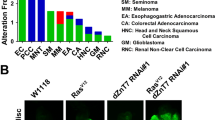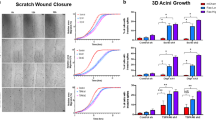Abstract
Mitochondrial respiratory function is frequently impaired in human cancers1,2,3,4. However, the mechanisms by which mitochondrial dysfunction contributes to tumour progression remain elusive. Here we show in Drosophila imaginal epithelium that defects in mitochondrial function potently induce tumour progression of surrounding tissue in conjunction with oncogenic Ras. Our data show that Ras activation and mitochondrial dysfunction cooperatively stimulate production of reactive oxygen species, which causes activation of c-Jun amino (N)-terminal kinase (JNK) signalling. JNK cooperates with oncogenic Ras to inactivate the Hippo pathway, leading to upregulation of its targets Unpaired (an interleukin-6 homologue) and Wingless (a Wnt homologue). Mitochondrial dysfunction in Ras-activated cells further cooperates with Ras signalling in neighbouring cells with normal mitochondrial function, causing benign tumours to exhibit metastatic behaviour. Our findings provide a mechanistic basis for interclonal tumour progression driven by mitochondrial dysfunction and oncogenic Ras.
This is a preview of subscription content, access via your institution
Access options
Subscribe to this journal
Receive 51 print issues and online access
$199.00 per year
only $3.90 per issue
Buy this article
- Purchase on Springer Link
- Instant access to full article PDF
Prices may be subject to local taxes which are calculated during checkout




Similar content being viewed by others
References
Brandon, M., Baldi, P. & Wallace, D. C. Mitochondrial mutations in cancer. Oncogene 25, 4647–4662 (2006)
Carew, J. S. & Huang, P. Mitochondrial defects in cancer. Mol. Cancer 1, 9 (2002)
Modica-Napolitano, J. S., Kulawiec, M. & Singh, K. K. Mitochondria and human cancer. Curr. Mol. Med. 7, 121–131 (2007)
Pedersen, P. L. Tumor mitochondria and the bioenergetics of cancer cells. Prog. Exp. Tumor Res. 22, 190–274 (1978)
Bissell, M. J. & Hines, W. C. Why don’t we get more cancer? A proposed role of the microenvironment in restraining cancer progression. Nature Med. 17, 320–329 (2011)
Igaki, T., Pagliarini, R. A. & Xu, T. Loss of cell polarity drives tumor growth and invasion through JNK activation in Drosophila. Curr. Biol. 16, 1139–1146 (2006)
Lee, T. & Luo, L. Mosaic analysis with a repressible cell marker for studies of gene function in neuronal morphogenesis. Neuron 22, 451–461 (1999)
Mandal, S., Guptan, P., Owusu-Ansah, E. & Banerjee, U. Mitochondrial regulation of cell cycle progression during development as revealed by the tenured mutation in Drosophila. Dev. Cell 9, 843–854 (2005)
Morata, G., Shlevkov, E. & Perez-Garijo, A. Mitogenic signaling from apoptotic cells in Drosophila. Dev. Growth Differ. 53, 168–176 (2011)
Hou, S. X., Zheng, Z., Chen, X. & Perrimon, N. The Jak/STAT pathway in model organisms: emerging roles in cell movement. Dev. Cell 3, 765–778 (2002)
Giebel, B. & Wodarz, A. Tumor suppressors: control of signaling by endocytosis. Curr. Biol. 16, R91–R92 (2006)
Jiang, H. et al. Cytokine/Jak/Stat signaling mediates regeneration and homeostasis in the Drosophila midgut. Cell 137, 1343–1355 (2009)
Pastor-Pareja, J. C. & Wu, M. and Xu, T. An innate immune response of blood cells to tumors and tissue damage in Drosophila. Dis. Model. Mech. 1, 144–154 (2008)
Staley, B. K. & Irvine, K. D. Warts and Yorkie mediate intestinal regeneration by influencing stem cell proliferation. Curr. Biol. 20, 1580–1587 (2010)
Martin-Blanco, E. et al. puckered encodes a phosphatase that mediates a feedback loop regulating JNK activity during dorsal closure in Drosophila. Genes Dev. 12, 557–570 (1998)
Shen, H. M. & Liu, Z. G. JNK signaling pathway is a key modulator in cell death mediated by reactive oxygen and nitrogen species. Free Radic. Biol. Med. 40, 928–939 (2006)
Sykiotis, G. P. & Bohmann, D. Keap1/Nrf2 signaling regulates oxidative stress tolerance and lifespan in Drosophila. Dev. Cell 14, 76–85 (2008)
Finkel, T. & Holbrook, N. J. Oxidants, oxidative stress and the biology of ageing. Nature 408, 239–247 (2000)
Owusu-Ansah, E., Yavari, A., Mandal, S. & Banerjee, U. Distinct mitochondrial retrograde signals control the G1-S cell cycle checkpoint. Nature Genet. 40, 356–361 (2008)
Pan, D. The hippo signaling pathway in development and cancer. Dev. Cell 19, 491–505 (2010)
Karpowicz, P., Perez, J. & Perrimon, N. The Hippo tumor suppressor pathway regulates intestinal stem cell regeneration. Development 137, 4135–4145 (2010)
Ren, F. et al. Hippo signaling regulates Drosophila intestine stem cell proliferation through multiple pathways. Proc. Natl Acad. Sci. USA 107, 21064–21069 (2010)
Shaw, R. L. et al. The Hippo pathway regulates intestinal stem cell proliferation during Drosophila adult midgut regeneration. Development 137, 4147–4158 (2010)
Sun, G. & Irvine, K. D. Regulation of Hippo signaling by Jun kinase signaling during compensatory cell proliferation and regeneration, and in neoplastic tumors. Dev. Biol. 350, 139–151 (2011)
Wu, M., Pastor-Pareja, J. C. & Xu, T. Interaction between Ras(V12) and scribbled clones induces tumour growth and invasion. Nature 463, 545–548 (2010)
Downward, J. Targeting RAS signalling pathways in cancer therapy. Nature Rev. Cancer 3, 11–22 (2003)
Uhlirova, M., Jasper, H. & Bohmann, D. Non-cell-autonomous induction of tissue overgrowth by JNK/Ras cooperation in a Drosophila tumor model. Proc. Natl Acad. Sci. USA 102, 13123–13128 (2005)
Frei, C., Galloni, M., Hafen, E. & Edgar, B. A. The Drosophila mitochondrial ribosomal protein mRpL12 is required for Cyclin D/Cdk4-driven growth. EMBO J. 24, 623–634 (2005)
Doggett, K., Grusche, F. A., Richardson, H. E. & Brumby, A. M. Loss of the Drosophila cell polarity regulator Scribbled promotes epithelial tissue overgrowth and cooperation with oncogenic Ras-Raf through impaired Hippo pathway signaling. BMC Dev. Biol. 11, 57 (2011)
Acknowledgements
We thank J. Pastor-Pareja and M. Miura for comments on the manuscript; T. Sawada and K. Takino for technical support; D. Harrison, T. Orr-Weaver and H. Richardson for antibodies; T. Adachi-Yamada, U. Banerjee, D. Bohmann, F. Missirlis, M. Miura, H. Sun, T. Xu, Y. Hiromi, the Bloomington Stock Center, the Vienna Drosophila RNAi Center, the National Institute of Genetics Stock Center and the Drosophila Genetic Resource Center for fly stocks. We also thank T. Xu for encouragement. This work was supported in part by grants from the Ministry of Education, Culture, Sports, Science and Technology (MEXT) to S.O., M.E. and T.I, a Grant-in-Aid for Scientific Research on Innovative Areas from the MEXT to S.O. and T.I., the Japan Society for the Promotion of Science for Young Scientists to S.O. and M.E., the Japan Science and Technology Agency to T.I., the G-COE program for Global Center for Education and Research in Integrative Membrane Biology to S.O. and T.I.,the Fumi Yamamura Memorial Foundation for Female Natural Scientists to S.O, the Tomizawa Jun-ichi & Keiko Fund of the Molecular Biology Society of Japan for Young Scientists to S.O., the Takeda Science Foundation to S.O. and T.I., the Astellas Foundation for Research on Metabolic Disorders to T.I., the Kanae Foundation for the Promotion of Medical Science to T.I., the Senri Life Science Foundation to T.I. and a Human Frontier Science Program Career Development Award to T.I.
Author information
Authors and Affiliations
Contributions
S.O., Y.S., M.E. and T.I. designed the research, S.O., Y.S., M.E., M.N., A.B. and T.I. performed experiments, S.O., Y.S., M.E. and T.I. analysed the data, and S.O. and T.I. wrote the manuscript.
Corresponding author
Ethics declarations
Competing interests
The authors declare no competing financial interests.
Supplementary information
Supplementary Information
This file contains Supplementary Figures 1-13, additional references and the detailed Genotypes for Supplementary Figures 1-13. (PDF 11205 kb)
Rights and permissions
About this article
Cite this article
Ohsawa, S., Sato, Y., Enomoto, M. et al. Mitochondrial defect drives non-autonomous tumour progression through Hippo signalling in Drosophila. Nature 490, 547–551 (2012). https://doi.org/10.1038/nature11452
Received:
Accepted:
Published:
Issue Date:
DOI: https://doi.org/10.1038/nature11452
This article is cited by
-
YAP mediates the interaction between the Hippo and PI3K/Akt pathways in mesangial cell proliferation in diabetic nephropathy
Acta Diabetologica (2021)
-
Adamantinomatous craniopharyngioma as a model to understand paracrine and senescence-induced tumourigenesis
Cellular and Molecular Life Sciences (2021)
-
A novel regulator of ER Ca2+ drives Hippo-mediated tumorigenesis
Oncogene (2020)
-
JNK and Yorkie drive tumor progression by generating polyploid giant cells in Drosophila
Oncogene (2018)
-
Short-term activation of the Jun N-terminal kinase pathway in apoptosis-deficient cells of Drosophila induces tumorigenesis
Nature Communications (2018)
Comments
By submitting a comment you agree to abide by our Terms and Community Guidelines. If you find something abusive or that does not comply with our terms or guidelines please flag it as inappropriate.



